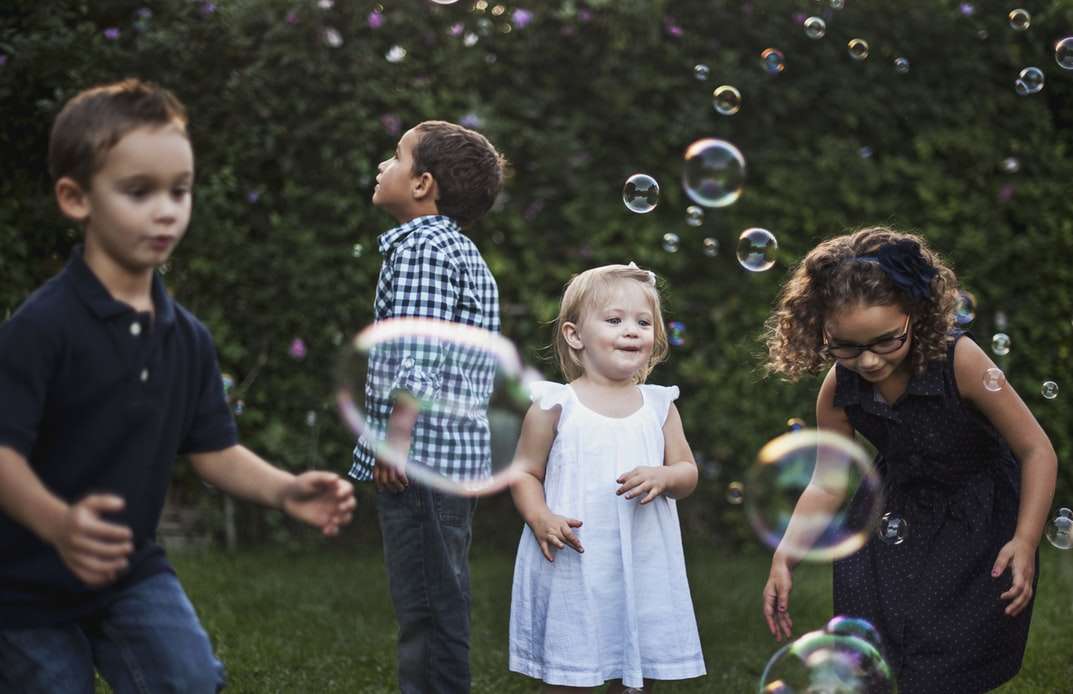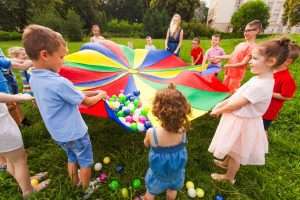[vc_row padding_top_multiplier=”” rc_link_color=”primary-1″ rc_link_hover_color=”primary-6″][vc_column][crocal_title heading_tag=”h2″ heading=”h5″ margin_bottom=”20px”]Learning through play begins much earlier than many recognise. Acknowledging the ‘Power of Play’ can be beneficial to development in EYFS.
[/crocal_title][vc_column_text]The ‘Power of Play’ is one of the most powerful tools at an early years practitioner’s disposal. The skills a child can develop through playtime are countless. Today, we want to dive into how nurseries can harness the ‘Power of Play’ into something that is not only fun but truly beneficial to a child’s development.
Of course, it’s no secret that children love to play. However, many remain sceptical that it offers anything more than simply having fun. The concept of play itself likely evokes a notion of a child passing the time. Even in these instances though – and whether they are playing alone or with others, quietly or boisterously – a valuable process is occurring. A child might practice skills, develop their inner voice, think independently or quietly explore their feelings.
At Nursery Story we strongly believe that play is crucial to a child’s development and supports their learning journey. Language, creative and social skills can all benefit from play. Below we take a look at how to understand play better and, most importantly, get the most out of it.
Very Early Years Play
For babies and very young children it’s undeniable that living, playing and learning are almost always one and the same. In fact, play actually begins in the womb when a mother might sing to the child or touch the place on her stomach where the baby has just kicked. These interactions, and those in the immediate aftermath of childbirth, can help create emotional warmth and interaction
Playfulness continues as the baby learns to read the face of their mother or caregiver. Babies are engaged with broad smiles and begin to understand the positivity behind these gestures. Soon, there’s a desire to experience whatever they can through sound, touch, smell and taste. As the baby grows and learns to move unaided, parents and caregivers watch on; keeping them safe but also allowing them to explore with a sense of independence.
As they continue their growth, a child’s interest in pretending becomes noticeable. They’ll often imitate what they have seen adults do by pretending to use the telephone or baking imaginary items. What should be clear now is that, through play, a child is always learning. The best nurseries are the ones that foster this and give children as many opportunities as possible to be exposed to new elements of play.
Play is Learning
If play and learning can’t be divided during the earliest years then it’s important this is recognised by parents and practitioners. Crawling, climbing, pushing, pulling, sitting and walking allow a child to understand what their bodies are capable of. Similarly, playtime allows for interaction with others and, more broadly, allows a child to soak up the environment they’re in. Whether they are playing hide-and-seek or blowing raspberries, play on this level can be an important time for developing social skills and emotional intelligence.
The LEGO foundation have researched this subject extensively and argue that learning through play happens when the activity is “experienced as joyful, helps children find meaning in what they are doing or learning, involves active, engaged, minds-on thinking…and social interaction.” Moreover, they suggest that due to the complex nature of a child’s development and learning, a holistic approach allows for their physical, social, cognitive, creative and emotional skills to complement and interact with one another.
Building a Playful Learning Environment
Firstly, it’s key to recognise that children develop at different rates, have different interests and often come from vastly different backgrounds. What they will need though is time, space and materials to place, investigate and explore. In order to create an enabling, supportive environment practitioners are encouraged to observe and then organise spaces, materials and the flow of the day. The cornerstones of promoting learning and development through play is offering stimulating opportunities to explore, be active and think creatively.
High-Quality Meaningful Experiences
Providing high-quality meaningful experiences for children is the next step in the ‘Power of Play’ and really something that everyone involved in the process (practitioners, children and parents) will appreciate. If children are able to participate in high-quality, meaningful experiences that go beyond normal ideas of ‘play’ then their fine motor skills will improve immeasurably. These activities might often be collaborative in nature but for each child the aim will be to allow them to experience success, develop resilience and master different tasks. Importantly, it will also foster a ‘can-do’ attitude and embed qualities in them that should lead to them becoming lifelong successful learners.
Some of the meaningful experiences we’ve seen have the greatest impact on a child’s development have come from activities such as loose parts play, where children are given an environment from which to make, build, experiment and invent. The initial idea of loose parts came from the architect, Simon Nicholson, who extols the benefits of using open-ended materials over a more fixed learning environment with toys and resources of fairly limited use: “As long as materials can be moved, redesigned, put together, and taken apart in a variety of ways, they are classified as loose parts.”
Daly and Beloglovsky (2015) suggested: “When children interact with loose parts, they enter a world of ‘what if’ that promotes the type of thinking that leads to problem solving and theoretical reasoning. Loose parts enhance children’s ability to think imaginatively and see solutions, and they bring a sense of adventure and excitement to children’s play.”
Whichever experiences you try then we’d love to see the results. Search ‘Nursery Story’ on Instagram, Facebook or Twitter and tag us to show us your best efforts![/vc_column_text][/vc_column][/vc_row]




